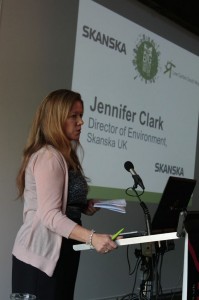Businesses have been supporting the city’s Big Green Week as momentum grows ahead of Bristol’s role as European Green Capital next year.
Bristol Chamber of Commerce & Initiative, part of Business West, embraced the week by encouraging member firms to move sustainability up their agenda.
And Low Carbon South West and construction group Skanska staged a thought-provoking panel discussion looking at building sustainable cities. The event attracted around 100 attendees. 
Business West initiative manager and vice chair of Bristol Green Capital 2015, Nina Skubala, pictured, said: “Going green delivers direct business benefits. Initiatives such as using green suppliers, a green travel plan or installing an environmental management system, not only reduces your negative environmental impact, but has an immediate effect on your bottom line.
“Today, customers, business partners and potential staff look favourably on firms that are environmentally responsible. A reputation for taking the right approach can be a key competitive differentiator for businesses. Big Green Week has been an opportunity for companies to shout about their achievements.”
The Bristol-based Schumacher Institute showed businesses how they can improve their resilience and stimulate innovation at an event on Wednesday staged at Leigh Court, the former stately home where Business West is based
Nina added: “We practice what we preach on ‘going green’. Business West is leading by example, despite some challenges including a diverse portfolio of buildings and office space, not to mention an 18th century mansion as headquarters.
“Companies might want to consider some of the projects that we have introduced such as cleaning systems, new radiators and zone control for heating to enable it to run as efficiently as possible, replacing traditional light bulbs with LED and the installation of electric car charging points. Solar hot water systems with energy efficient tanks, water boilers and dishwashers have resulted in Business West reducing water usage by an impressive 38%.
“Staff initiatives have also been really well received especially around sustainable transport. A cycle scheme gives staff access to money off new bikes and a car sharing club was set up to reduce staff mileage, with preferential parking for car sharers, resulting in 19% less business mileage claimed.”
Car-sharing is used by several members of staff, enabling their finances to go further. Head of marketing Mary Martin said: “I save roughly £15- £20 a week on fuel but collectively, the two of us save about £50 a week on fuel and probably more than that on the wear and tear on our cars. Over the year the savings really add up.”
At the sustainable cities event, Skanska director of environment Jennifer Clark shared her views on how collaboration supports sustainability, before taking part in the debate alongside Business West director James Durie, GVA Worldwide director of planning, development and regeneration at Jo Davis, Invest Bristol and Bath head of investment Matthew Cross, White Design founding director Craig White and Temple Group director Chris Fry.
Low Carbon South West network director Amy Robinson said: “Skanska’s approach to sustainable construction is a great fit with the work and aspirations of the region, and we were really pleased that such a great range of sustainability experts and enthusiasts joined us to discuss how we make Bristol, and cities like it, truly sustainable. We’re keen to use Bristol’s position as European Green Capital in 2015 as a catalyst to promote sustainability to the region and further afield.” 
Jennifer Clark, pictured, added: “We’re pleased to be working collaboratively with many organisations in the South West to help them to realise their sustainability goals. This panel discussion enabled us to find out more about the topics which concern local people and to offer our ideas.
“It has been a very positive experience working with Low Carbon South West to bring together all these organisations and to share knowledge about the region. Buy-in from key stakeholders can only help the region to achieve its ambitious environmental targets.”
Meanwhile the University of the West of England (UWE Bristol) has committed to put sustainability at the heart of everything it does as it aims to maximise its contribution to Bristol’s year as Green Capital.
The university was instrumental in helping with the successful bid through Prof Martin Bigg (former chair of Bristol Green Capital Partnership) and Prof James Longhurst, UWE assistant vice chancellor (environment and sustainability).
Prof Longhurst is now developing the UWE’s plans for a successful year and the long-term impact of the sustainability objectives.
Key to these is an ambitious university-wide initiative to embed understanding and awareness of sustainability within the curriculum across all subjects.
Working with the students’ union (UWESU) and academic departments, Prof Longhurst is leading an initiative to make engagement with the ideas behind sustainability, an aspect of the learning of all students.
Professor Longhurst said: “The education of our students is the biggest opportunity we have to encourage awareness and action for a more sustainable future. We send thousands of graduates out into the world every year, and whether they understand and are prepared to tackle the big issues is our real legacy. We are embedding sustainability as an aspect of our teaching in all subjects.
“The Green Capital Year provides a focus for many of the sustainable initiatives within the University. It is also an opportunity for UWE to contribute to the city’s environmental agenda, and to ensure a positive legacy from 2015 for the university’s sustainability agenda.
“Many of our students are signing up to a new UWE scheme for ‘green leaders’, whose role it is to challenge and inspire others at the university to make positive changes. Over 70 students have now signed up to the scheme across all campus locations.”
UWESU green leader coordinator Laura-Kate Howells added: “Our role is to encourage those at UWE to keep making positive changes and to help the University stay on track to its sustainability objectives. Our green leaders can help to inspire and engage students.”






























